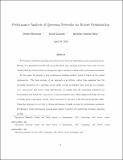Performance analysis of queueing networks via robust optimization
Author(s)
Gamarnik, David; Rikun, Alexander Anatolyevich; Bertsimas, Dimitris J
DownloadBertsimas_Performance Analysis.pdf (355.7Kb)
OPEN_ACCESS_POLICY
Open Access Policy
Creative Commons Attribution-Noncommercial-Share Alike
Terms of use
Metadata
Show full item recordAbstract
Performance analysis of queueing networks is one of the most challenging areas of queueing theory. Barring very specialized models such as product-form type queueing networks, there exist very few results that provide provable nonasymptotic upper and lower bounds on key performance measures.
In this paper we propose a new performance analysis method, which is based on the robust optimization. The basic premise of our approach is as follows: rather than assuming that the stochastic primitives of a queueing model satisfy certain probability laws—such as i.i.d. interarrival and service times distributions—we assume that the underlying primitives are deterministic and satisfy the implications of such probability laws. These implications take the form of simple linear constraints, namely, those motivated by the law of the iterated logarithm (LIL). Using this approach we are able to obtain performance bounds on some key performance measures. Furthermore, these performance bounds imply similar bounds in the underlying stochastic queueing models.
We demonstrate our approach on two types of queueing networks: (a) tandem single-class queueing network and (b) multiclass single-server queueing network. In both cases, using the proposed robust optimization approach, we are able to obtain explicit upper bounds on some steady-state performance measures. For example, for the case of TSC system we obtain a bound of the form C(1 – {rho})–1 ln ln((1 – {rho})–1) [C(1-p) superscript -1 ln ln ((1 - p) superscript -1)]on the expected steady-state sojourn time, where C is an explicit constant and {rho} is the bottleneck traffic intensity. This qualitatively agrees with the correct heavy traffic scaling of this performance measure up to the ln ln((1 – {rho})–1) [ln ln((1 - p) superscript -1)] correction factor.
Date issued
2011-03Department
Massachusetts Institute of Technology. Operations Research Center; Sloan School of ManagementJournal
Operations Research
Publisher
INFORMS / Operations Research Society of America
Citation
Bertsimas, Dimitris, David Gamarnik, and Alexander Anatoliy Rikun. “Performance Analysis of Queueing Networks via Robust Optimization.” OPERATIONS RESEARCH 59.2 (2011) : 455-466. Copyright © 2011 by INFORMS.
Version: Author's final manuscript
ISSN
1526-5463
0030-364X